6 Jun 2017 | Campaigns, Campaigns -- Featured, Turkey, Turkey Statements
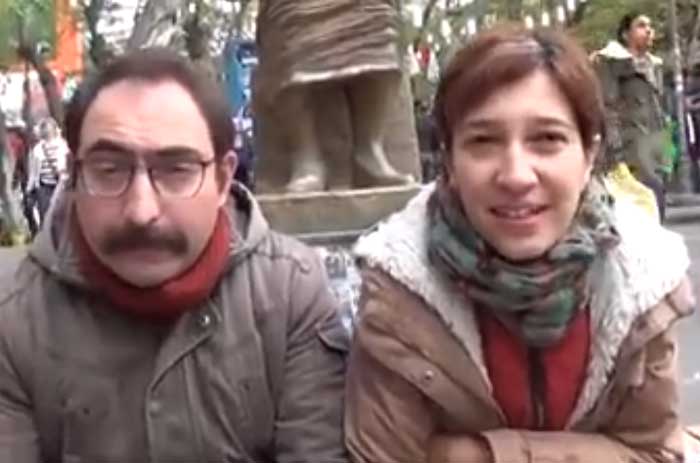
Nuriye Gulmen, a professor of literature, and Semih Ozakca, a primary school teacher, were both fired following the issuing of emergency decree 675 by Erdogan’s government.
In the wake of the July 2016 coup attempt in Turkey, President Recep Tayyip Erdogan dismissed over 8,000 academics from state institutions following Emergency Decree 675. Literature professor Nuriye Gulmen and primary school teacher Semih Ozakca were two such individuals affected by the purge. Both Gulmen and Ozakca were dismissed and have been detained by Turkish authorities over 30 times, most recently on 22 May, for their demands to be reinstated to their positions. They are now facing terror charges simply for asking for their job back.
We urgently need your help to call for the release of Nuriye Gulmen and Semih Ozakca and express your solidarity with their cause.
Gulmen and Ozakca began a hunger strike, which is currently on its 90th day, to protest the crackdown on academic freedom. Consuming little more than salt water, a single B vitamin, and a sugar solution, Ozakca has lost over 37 pounds and Gulmen has experienced heartburn, difficulty moving, and trouble concentrating. Both academics suffer from muscle atrophy and are now wheelchair bound.
Read more about Gulmen and Ozakca’s protest and the current crackdown on freedom of expression in Turkey
Index on Censorship stands in solidarity with Gulmen and Ozakca and pledges its full support for their right to protest. We ask you to do the same: demanding an end to the dismissal of academics and the immediate release of Nuriye Gulmen and Semih Ozakca. While their plight has gained international attention, both strikers have received little recognition from their own government. As such, we ask you to speak out on Ozakca and Gulmen’s behalf in the form of a brief video expressing solidarity with their strike and requesting academic freedom for Turkey.
Take Action
— Post a solidarity message on social media.
— Share the story of Nuriye Gulmen and Semih Ozakca with your network.
— Tweet: [socialpug_tweet tweet=”I stand with @nuriyegulmen, @semihozakca and #academicfreedom #DontletNuriyeAndSemihDie #Turkey” remove_url=”yes” remove_username=”yes”]
6 Jun 2017 | News, Turkey
[vc_row][vc_column][vc_column_text]
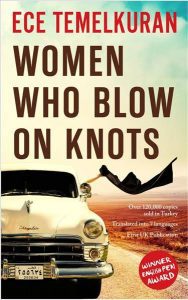
Index on Censorship contributor Ece Temelkuran’s latest novel is Women Who Blow on Knots.
Turkish author Ece Temelkuran is growing increasingly anxious about life under President Erdogan, she told Index on Censorship.
“After the failed coup attempt, the crackdown began on journalists, but we thought that writing fiction would provide a safe shelter,” she said. “Now we are seeing even the novelists are being targeted, and it makes you think there is no haven for anyone with critical thought.”
Asked whether her worries have begun to affect her own work, she paused before adding: “There is no justice in Turkey as we know it in the West. We don’t know what tweet, what thing you write could be the thing that puts you under the spotlight. The unhappiness in Turkey is so big, so palpable that you can touch it. It paralyses the human mind. Turkey does not let you do any intellectual work.”
However, Temelkuran, speaking to Index in London at an event to promote her new book The Women Who Blow on Knots, insisted that she would never allow Erdogan to force her to flee her homeland.
“The idea of leaving Turkey permanently is horrible because it deprives you of home, which I believe is inhumane. The supporters of Erdogan are constantly claiming that they are the ‘real people’ of Turkey, and I feel we have to constantly remind them that we are also real people.”
With the country heading down an authoritarian path following Erdogan’s success in a recent referendum that granted him vast new powers, Temelkuran believes Turkey faces a long road back. “It’s not easy to be hopeful, but one can be easily inspired by the people who are resisting,” she said, giving the example of two educators, Nuriye Gulmen and Semih Ozakca, who went on hunger strike in March 2017 in protest at losing their public sector jobs in the post-coup purge. Soon after Temelkuran’s interview, the pair were arrested and charged with membership of a terrorist organisation. They vowed to continue striking in prison.
The Women Who Blow on Knots tells the story of a group of women travelling through the Middle East during 2011’s Arab Spring. In conversation with author Diana Darke, Temelkuran explained that the title of her book is a reference to a passage from the Koran warning of the evil of women who performed witchcraft by blowing onto knotted rope, inverting the idea into an acknowledgement of female power.
“If our breath is so strong why not use it,” she said. “The main idea is that women blow life into things, into men, into children, into anything. They create life.”
The novelist also referred to one scene in which a group of Libyan militia women are watching Sex and the City, saying that she believes cultural divisions are overrated. “We’re watching the same TV series, using the same brands, reading the same books, we are watching the same Trump, whatever. The world is not completely like one village, but the cultural references are getting more and more common.”
However, in the context of a divided Turkey, she said that “it is as if there is this soundproof wall” in the middle of the country, with neither east nor west caring to learn about life on the other side. “This is something that I learned in early ages – the ones who stand in the middle get shot by both sides.”[/vc_column_text][/vc_column][/vc_row][vc_row][vc_column][vc_basic_grid post_type=”post” max_items=”12″ style=”load-more” items_per_page=”4″ element_width=”6″ grid_id=”vc_gid:1496743531699-19a91ff0-06b4-6″ taxonomies=”8607″][/vc_column][/vc_row]
5 Jun 2017 | News, Turkey, Turkey Uncensored
[vc_row][vc_column][vc_column_text]
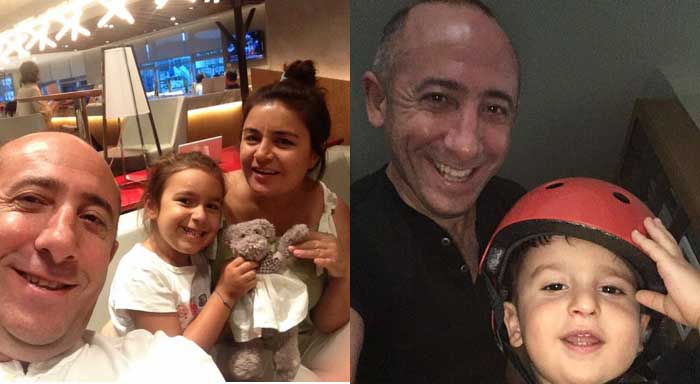
Journalist Murat Aksoy has been detained since his first arrest on 3 September 2016. Above, Aksoy with his wife Şehriban, daughter Zehra Duru and son Ali Emre.
Journalist Murat Aksoy was arrested twice during the government’s investigations into Turkey’s failed coup of 15 July.
On 6 June, prosecutors filed an indictment seeking two life sentences for Aksoy and 12 other defendants.
His first arrest was on 3 September 2016 on suspicion of being involved with the Fethullah Gülen network — an Islamist group allegedly behind the attempted coup, officially called the Fethullahist Terrorist Organisation (FETÖ) by the regime.
A court ordered Aksoy released on 31 March pending trial, but before he even left Silivri Prison he was detained again along with 13 others, this time on charges of “attempting to overthrow the government”.
The charges are baffling, according to his wife of 17 years, Şehriban Aksoy. “When the headscarf was banned, he always wrote articles against the ban. We are speaking of a man who stated at every opportunity that the state doesn’t have the right to interfere in anyone’s outfit.”
Except for a brief period at the Millet newspaper, Aksoy did not work at any news organisations believed to be affiliated with the Gülen group — something that is now considered a crime. He wasn’t even religious, according to Şehriban.
“Our families are from Tunceli, we are Alevi,” his wife says, referring to a religious minority group in Turkey, whose practices and beliefs often fall outside the scope of Islam, although there are those who argue that it is part of the faith. “Being an Alevi, he defended people’s right to wear the headscarf; their freedom. This [imprisonment] has happened to someone defending [this right]. He hasn’t written a single line in his entire life praising FETÖ.”
He has worked for many outlets. When they conducted the first wave of the post-coup arrests, he hosted a radio programme on YÖN FM, a pro-Republican People’s Party (CHP) radio station. A government minister once featured on his programme. He also worked for eight years at Yeni Şafak, a pro-government daily.
At the time of this dismissal, the couple’s son Ali Emre had just been born. “We needed an income. That’s why he agreed to write for Millet when the newspaper made an offer,” Şehriban said. The outlet was shuttered under the first cabinet decree issued under Turkey’s state of emergency rule, which was introduced after the coup attempt.
A life of journalism
Aksoy was born in 1968 in Erzincan, although his birth year on his ID card is 1972. It is a common practice in rural Turkey for children to sometimes be officially registered a few years after their actual birth.
According to his wife and many others who know him, Aksoy is a sentimental and emotional man who easily gets teary-eyed. This may be because of his background, Şehriban says. When Aksoy was young, his family moved to Istanbul where his father owned a grocery store. When he was in the first grade, his mother died after a long illness. With his father busy working, Aksoy was often left in the care of his father’s sister-in-law.
The family lived in Okmeydanı, a predominantly Alevi neighbourhood in Istanbul. This is where Aksoy and Şehriban met as children. “We both lived on the street where Berkin was shot,” Şehriban remembers, referring to Berkin Elvan, a 14-year-old boy who was injured during the Gezi protests when a police officer aimed a gas canister at his head. Elvan died following 269 days in a coma.
Aksoy attended the Kabataş High School in Istanbul. After graduation, he studied business management at Erciyes University in Kayseri, although he never worked in business. Shortly after graduating from the university in the early 1990s, he worked briefly for the newspaper Radikal, and then at various civil society organisations. During his time at the Islamist Yeni Şafak, where “he never hid his true identity [as an Alevi],” according to his wife.
Days filled with work and kids
Aksoy was fired by Yeni Şafak in the constrained atmosphere in the months after the anti-government Gezi Park protests of 2013. In the columns he wrote at the time, Aksoy had criticised the government’s brutal approach toward peaceful protesters. “They first cut his column down to fewer days. Then they slowly drove him away just the way they slowly drove us away from Silivri Prison that night,” his wife says.
He was finally terminated by the paper in early January 2014 when he expressed an opinion about the government’s handling of a political crisis following a December 2013 corruption scandal in which four ministers and members of President Recep Tayyip Erdogan’s family were implicated.
After he left Yeni Şafak, Aksoy worked exclusively from home. He would get up at around 7am, read the newspapers and take notes while having breakfast, and then send his daughter to school. He later worked in his study, writing articles or preparing for television programmes where he often appeared as a commentator. He would go grocery shopping or go on walks with his wife. When his daughter got home from school, Aksoy usually helped her with her homework.
In addition to writing for various newspapers, Aksoy worked as a consultant for the Republican People’s Party (CHP) and he was on the parliament payroll. This was an important means of financial support for the family, but it was cut off after his arrest by the parliament administration. Şehriban, who has to take care of two small children, doesn’t have a job.
The case against Murat Aksoy
Although Aksoy was arrested for aiding FETÖ through his work, his accusers “can’t cite a single article which serves this alleged purpose,” says Şehriban.
He is being represented by a prominent human rights lawyer, Yaman Akdeniz, who was nominated for a 2015 Freedom of Expression Award for his work defending online rights. Aksoy was also accused of having prior knowledge of the coup plot because he had warned viewers in a program on pro-CHP Halk TV that there were rumours of a coup preparation.
The night when Şehriban and her family waited for Aksoy’s release in vain has been a major trauma for the family. “It took me a full week to recover. You have these crazy thoughts, you say to yourself ‘let this end now’. It was like a nightmare,” she says. “While they were kept in police custody for 15 days in between their release and second arrest, I thought at least we could talk on the phone every two weeks when he was in prison, but they don’t let you do that in detention.”
For many of the families caught up in the coup trials, the hardest part is managing the feelings of their children. Aksoy and Şehriban have two, a son and a daughter: Ali Emre is two-years-old and Zehra Duru is 10.
Ali Emre’s second birthday took place about a month after her father was arrested. “He has been growing more quickly after his father’s arrest. He sometimes takes his father’s photograph to bed with him and kisses is,” Şehriban says. “The children miss their father immensely. I take them to see their father once a month during open visits.”
Aksoy also misses his children. “The last time we visited, Ali Emre bit his ear, but his father didn’t notice; he was so thrilled to be holding his son. I gave him a tissue, and he asked me why. He had no idea his ear was bleeding,” his wife says.
For the first few months of Aksoy’s imprisonment, the family told Duru that her dad had gone to a writers’ camp to work on a report with fellow writers. Into the fourth month, they had an honest conversation with her. “I explained to her that her father is a good man and he is in prison because of a thought crime. Now she knows, she says that her father is in prison because he defended what’s right,” Şehriban says.
The family was lucky in comparison with many others who were imprisoned in the coup-related trials: Duru’s friends at school didn’t stop talking to her.
The night when her father wasn’t released despite the court ruling was among the hardest moments for the little girl. “Duru wanted to drive with me to prison to pick him up. I convinced her to stay at home, and I said ‘your father will be here when you wake up in the morning’. I promised her,” Şehriban says. “The next morning, she woke up and started going into every room inside the house, looking for her father. It was perhaps more difficult than when he was arrested for the first time. Then she started yelling at me: ‘You are a liar, you lie!’ Our relationship was horrible for an entire month.”
Şehriban is thankful her husband isn’t mistreated in prison, but quickly adds that he and his fellow inmates don’t trust prison food. At meal times, they buy ready-made soup mixes and canned food from the prison cafeteria.
Not everything has been nightmarish through the ordeal. Opposition politicians have been supportive. CHP leader Kemal Kılıçdaroğlu publicly said of Aksoy: “I am as certain that he [is not related to any terror groups] as I am certain of myself.”
“But when they were arrested for the second time, I knew that this was something else. They couldn’t satisfy their wrath. They should just tell us that he is in prison because of his critical views. They did the same thing to Sözcü,” his wife says, referring to recent operations where two employees of the newspaper, which is staunchly secular and also outspokenly anti-government, were arrested on “FETÖ” related charges.
Sunlight in the doctor’s office
Although Aksoy was never subject to any physical abuse, he has had difficulty coping with being in prison. “He cried a lot,” remembers Şehriban.
Like most other journalists imprisoned in the coup investigation, Aksoy cannot see the other journalists kept at Silivri Section-9. He shares a cell with singer-turned-journalist Atilla Taş and journalist Gökçe Fırat Çulhaoğlu, and those are the only two people whom he can have conversations with. They are allowed in the open-air briefly in very tiny courtyards, which are covered by wired fences all around, making it impossible to get a full view of the sky.
Aksoy has started seeing the prison psychiatrist. He finds the sessions helpful, but what he enjoys most is visiting the doctor’s office. As Şehriban explains: “You get to see a different scenery. For example, there is an artificial plant in the room, which makes him really happy. There are medicine cabinets; files with the names of his fellow journalists on them. Also, at the doctor’s office, he says gets a lot of sunlight. He says he deliberately places his chair in the sun; that he regrets those days when he never once even looked up in the sky when he was free.”[/vc_column_text][vc_column_text]

Turkey Uncensored is an Index on Censorship project to publish a series of articles from censored Turkish writers, artists and translators.
[/vc_column_text][/vc_column][/vc_row][vc_row][vc_column][vc_basic_grid post_type=”post” max_items=”12″ style=”load-more” items_per_page=”4″ element_width=”6″ grid_id=”vc_gid:1496825503813-3d9c0008-4723-2″ taxonomies=”8607″][/vc_column][/vc_row]
3 May 2017 | News, Turkey, Turkey Uncensored
[vc_row][vc_column][vc_column_text]
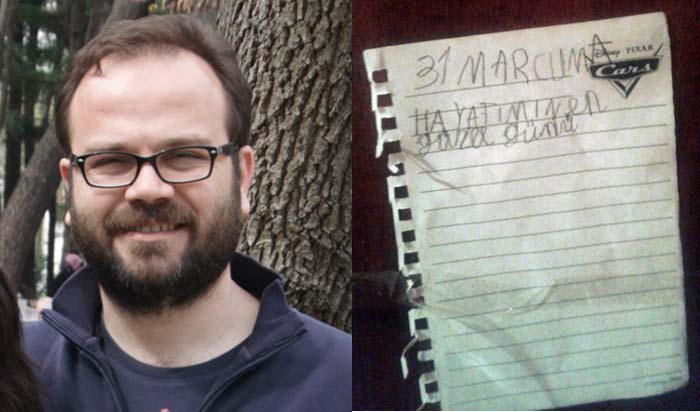
Journalist Oguz Usluer has been accused of being a terrorist. The note, from his six-year-old son, reads: “31 March Friday. The happiest day of my life.”
On 31 March 21 journalists who were charged with working for the media arm of the alleged group behind the 15 July coup attempt were released by a court ruling. Following a tweet from a pro-government troll account, the prosecutor filed an objection to the release of eight and announced that it had launched a new investigation for the other 13.
The judges who issued the release ruling were suspended about a week after the trial.
During the few hours before the new detention warrants came, their families had already driven to Silivri Prison, where they have been held for months. Among them was Sunay Usluer, the wife of a former television coordinator who was arrested in December 2016. She shared with Index on Censorship her account of the anxious hours waiting for the release that never came.
“I am planning to bring the children to the next visit after the trial.”
“But of course there is always the possibility that I might be released in the next session, although you seem not to even consider that.”
Such was the conversation I had with my husband Oğuz on Thursday 23 March, during my last prison visit before the 31 March trial hearing. This entire process had the air of a tragicomical joke; we were laughing when we should have been crying. Although for the past four months, neither of us had given up hope, we didn’t really expect a fair trial or a release ruling from the court. But, at least, we would be able to see each other for five days in a row during the scheduled trial sessions; a rare occurrence.
With this motivation, we started the five-day session marathon. The 25 people, who were on trial for membership in a terrorist organisation and who didn’t know each other in the slightest, were in the front row in the courtroom. Dozens of their family members, living 25 different human stories together with them, sat in the back of the room. Everyone wore the same exhausted expression on their face, reflecting the months fraught with ambiguity and fragile flickers of hope.
While waiting for the trial sessions that never seemed to start, or while waiting during long intervals, people who put their own identities aside and described themselves as the “wife, mother, son/daughter” of a particular journalist, started speaking about the shared-yet-separately-lived agony they have endured, after months of longing for a conversation with someone who can understand them. One of them said, “I can’t tell you how happy I am to see that people who are going through the same tribulations as me still being able to laugh,” while we laughed as we played a game of release-lotto with our lawyer.
Our lawyer has been extremely supportive in this process. He always had hope, but I was the devil’s advocate. “You say he will be released, but I will not believe that until I see him next to me.”
Court officials moved the trial to a smaller courtroom for the final three days. Family members of those on trial were allowed inside only for 15 minutes in whatever room was left unoccupied by journalists and lawyers.
On the morning of the fifth and final day, the prosecutor was reading out a list of those he recommended be released. At that moment, I caught Oğuz’s eye and made a gesture asking if he was on the list. “Yes, but it’s only the prosecutor’s request,” he said, in order to fend off the likely frustration that might follow. Fearing to have hope is worse than despair; something we have found out in this process.
At the end of the fifth day, everyone was too exhausted to even speak. While waiting for the court’s decision, only the sounds of shy seagulls from outside could be heard as if it was sinful to talk in the corridor where the 25th High Criminal Court is located. Then there was the sound of a notification on my phone, and the ticker reading “released” on a television screen. This scene was followed by 21 families, crying tears of happiness, hugging each other. People who still found the news hard to believe, relying on confirmations from each other.
“I couldn’t believe it. I walked towards the courtroom, and I asked a lawyer who I didn’t know at all if my husband is among those released. I suddenly gave him a hug when he answered yes,” somebody said.
Later, our lawyer walked out of the courtroom. His first remark took a jab at my longstanding incredulity. I still had no intention of believing that he really was to be released until he was next to me. I didn’t voice my concern in the way you think you might jinx a good thing if you say something negative. I, carrying this worry in my heart, my ten-year-old son, whom I’d brought with me so that he could at least catch a glimpse of his father, and our relatives celebrated. Oğuz’s family in İzmir were already boarding a plane to Istanbul to celebrate with us. We will most likely have picked him up from prison by the time they arrive, I thought.
We left the courthouse with a sense of joy and began driving to Silivri. Even the distance, which has become complete torture for us as we have to travel every week, felt short. Families were already waiting outside the main gate of the Silivri Prison in the anticipation of seeing their husbands, fathers and brothers again. Everyone was smiling now, carrying on conversations filled with hope despite the biting cold. One family had brought a celebratory band of drummers from Edirne, who were going to play as their relative was released. Everyone’s eyes were fixed on the main gate.
The first few hours were just like a carnival.
Then the mood changed. The crowd started to feel that something was off, but no one had the courage to speak it. In the middle of the night, vehicles that didn’t have official license plates entered the prison one after another, and all of them drove towards Section 9. Later, they set up a barricade to block the view of the parking lot that faced the main gate. A police van entered the prison. Could it be that they had brought them to the prison from the courthouse just now? At some point, armoured vehicles of the gendarmerie special operations command arrived. Wasn’t this much security a bit extreme for a handful of people?
The air of festival had left the crowd, and it had gotten much colder. Still, nobody could bring themselves to speak the fear they held. Many of them started waiting in their cars, saying it was too cold. As I waited inside the car, a friend texted me, telling me to be cautious and sent a tweet posted by some creature:
“We will take’em if you release’em,” it said.
At that moment, in the middle of the night in the Silivri cold, in what was possibly the most secure part of my country, among the gendarmerie and police officers, I feared for the life of the children playing between the parked cars despite the cold air and for the life of my own son.
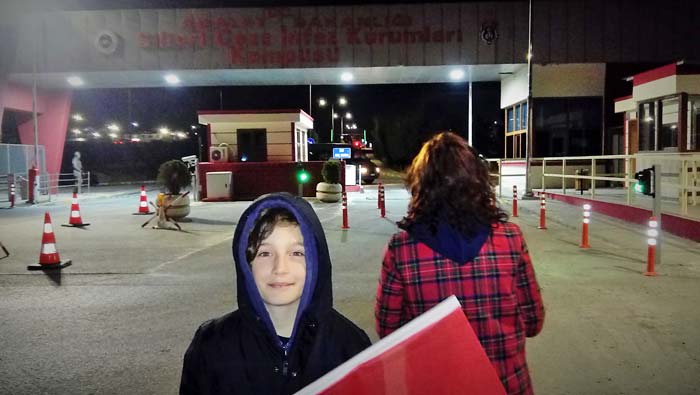
Dr. Sunay Usluer and her ten-year-old son waited outside the dates of the prison for a release that never came.
What came after was a long and desperate wait; a semblance of hellish torture. All of a sudden, they forbid us to wait near the prison because of the state of emergency, and we were ordered to drive towards the highway slip road; they said those released would be brought there. In that moment, somebody worked up the courage to ask: “Is there a problem?”
“There is no problem Miss, the release procedures are being conducted inside. It’s just taking a bit of time because there are many people. Continue to wait in the area ahead.”
But that “area ahead” kept moving forward. People were constantly driven away further and further from the prison, and finally, they ended up waiting at a spot from where the slip road was invisible. At the entrance to the highway, there was a gendarmerie vehicle, guarded by two privates. Every time we asked them what was going on, they could only tell us: “We can only give you information when our commanders give us information.” At the same time, we kept checking our Twitter feeds. At this point, it became clear that no one would be released tonight, but none in the crowd could drop the slightest flicker of hope and leave, so we waited on and on and on.
There were small children and older people among those waiting. At some point, the vehicles started to leave one by one, eventually, maybe ten or fifteen vehicles remained. My son and I also gave up hope and decided to go home. But as we stopped to ask the gendarmerie private if there had been any developments one last time, we saw a police van in the distance.
We got back into the car and started driving towards the van. As we passed, we caught the attention of a dark silhouette inside the vehicle, who had leant his head against the window. When he saw us in the car, a flash of joy went through his body, he cocked his head and waved at us. It was him: a tiny miracle gave us the information that our supreme state had denied us. Oğuz had been detained again and he was being driven back to Istanbul, to the police department. The police van slowed down for us to pass it. We wanted to drive near again and take a better look, but this time plainclothes officers drove us away.
The hardest part in all of this is to try and maintain one’s composure in front of the children. My son and I lived this experience as if we were having a good time; as if we were in an adventure movie. Neither of us cried. But when we reached home in the early morning hours, we were met with a note by my six-year-old son, who is just learning to write, on the door. “31 March Friday. The happiest day of my life.” His brother and I sat down on the stairs of our building, held each other and burst into tears. How were we to explain to him why his father hadn’t come home?
This was how I saw my husband 15 days ago. After that, he and his co-defendants were kept for in detention seven days at the police station on Vatan Street in Istanbul, which was extended for another seven days. During this time, they sent us his belongings from Silivri Prison; his notes, summaries of books he wrote down. For the past months, he wasn’t allowed to send mail.
I was exhilarated as if I had gotten a pages-long letter; I even read the receipts he had kept from the prison cafeteria. There was also a to-do-list, where he wrote down what he planned to do after his release. The first item on his list was, “Don’t forget about those who remain in prison, and don’t let them be forgotten.” At the end of the day, he is a journalist.
The process that followed was the same as before, police interrogation, another desperate wait at the Çağlayan courthouse during the prosecutor’s questioning and court interrogation, again “what if”; once again disillusionment and ambiguity. What happened to the previous panel of judges only shows the extent of independence of our judiciary and sets the maximum for our expectations.
At the end, they were rearrested on new charges, a decision that didn’t really surprise us. All we could do was say, at least they are back in Silivri Prison, back to their routine, sleeping in a normal bed [as opposed to detention conditions]. I woke up on Saturday and called the prison to find out if they had moved him to a different cell. “Nobody was brought here last night,” the voice at the end of the line said.
I later found out that the police, which drove back to Silivri in a convoy without wasting a second to re-arrest them on the night of 1 April — were simply too lazy to drive back to Silivri on 16 April and they dumped my husband — my partner of 12 years, the father of my children, a yeoman journalist who dedicated 20 years to reporting the news — at Metris Prison [in central İstanbul] like some piece of baggage dropped at storage for safe keeping.
Period.
Dr. Sunay Usluer
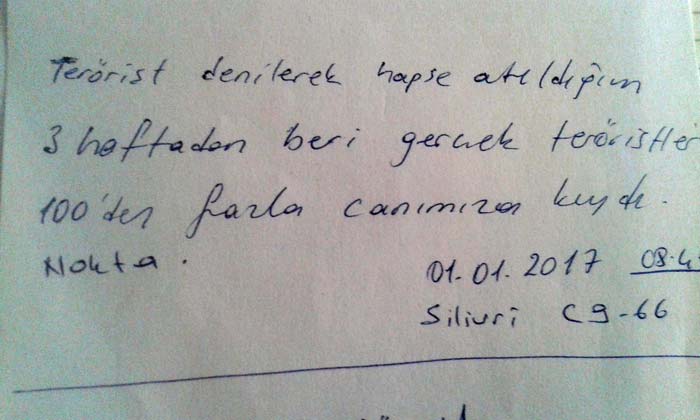
“In the past three weeks, during which I have been imprisoned being declared a terrorist, real terrorists have taken away 100 lives from us.”
[/vc_column_text][vc_column_text]

Turkey Uncensored is an Index on Censorship project to publish a series of articles from censored Turkish writers, artists and translators.
[/vc_column_text][/vc_column][/vc_row][vc_row][vc_column][vc_basic_grid post_type=”post” max_items=”12″ style=”load-more” items_per_page=”4″ element_width=”6″ grid_id=”vc_gid:1493981743376-3f86911a-75c7-0″ taxonomies=”8607″][/vc_column][/vc_row]







